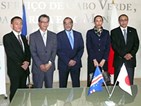Signing Of A Japanese ODA Loan Agreement With The Republic Of Cape Verde

Supporting improvement of power supply situation and mitigation of climate change in an island country in Westernmost Africa
- Recently, the Japan International Cooperation Agency (JICA) signed an ODA loan agreement of up to 6.186 billion yen with the government of the Republic of Cape Verde for "Electricity Transmission and Distribution Network Development Project". This is the second ODA loan between Japan and Cape Verde and it will be co-financed by the African Development Bank under the framework of the Enhanced Private Sector Assistance (EPSA) for Africa.[1]
- The project aims to stabilize power supply and improve access to electricity on 6 islands by implementing new installation, enhancements and update works on their transmission and distribution lines. The project is expected to help improve the country's living environment as well as contribute to the vitalization of its economy. In addition, the reduction of transmission and distribution loss and the electrification of non-electrified rural communes are expected to contribute to climate change mitigation as they would reduce the emission of greenhouse gases. The fund obtained through the ODA loan will be appropriated for the construction of transmission, distribution and substation facilities as well as other necessary costs.
- The Republic of Cape Verde is a country consisting of 15 islands of various sizes and is located off the west coast of Africa[2]. The country has pursued a development model that revolves around tourism and doesn't depend on the consumption of its natural resources, which has acquired a high regard as a growth model for African countries. The rapidly growing tourism industry and others are expected to raise power demand in the country by 10% per year over the next five years. The country, with its limited water resources, also relies on stable and sufficient supply of power for securing its drinking water, a part of which is obtained by the desalination of sea water.
- The installation capacities of its power generation, transmission and distribution facilities are in short supply and existing facilities have deteriorated over the years. It is also impossible to import power from other countries. The country has difficulty meeting demands to supply power to drive the desalination plants or various health and social services. The history of having relied upon the independent initiatives of local communes to provide their own small-scale power generation and terminal transmission and distribution network has led to the weakness in long-distance and high-voltage transmission and distribution network facilities, giving rise to high transmission and distribution loss. The 6 target islands face problems including electricity loss, blackout and electrification ratio, and a stable transmission and distribution network is much needed.
- JICA has previously supported the country's power sector through "Power Generation, Transmission and Distribution Capacity Building Project on Santiago Island"[3], and plans to continue its effective support to achieve sustainable economic growth of Cape Verde.
SOURCE: Japan International Cooperation Agency
